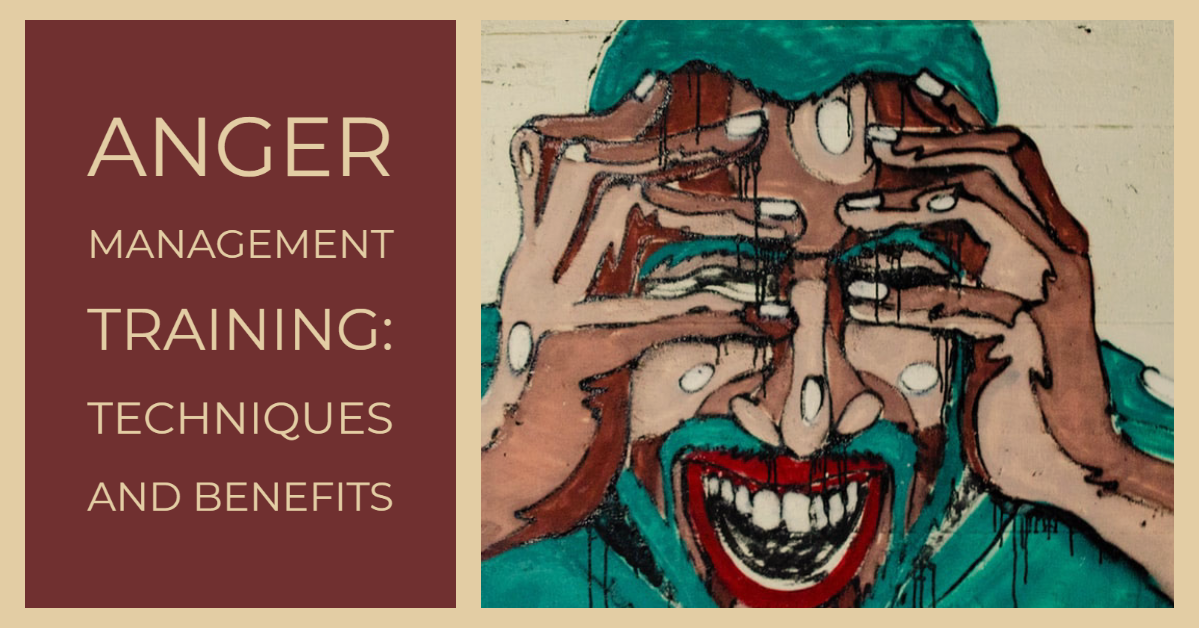Emotional regulation is the ability to manage and control one’s emotions effectively. It involves recognizing and understanding emotions, and responding to them in a healthy and constructive manner. Anger management is a specific aspect of emotional regulation that focuses on managing anger and preventing it from escalating into destructive behavior. There are several anger management techniques and strategies that individuals can employ to regulate their anger. Anger management training program offers numerous benefits for individuals seeking to improve their emotional regulation skills.
Anger is a natural emotion that everyone experiences from time to time. However, if left unchecked, it can lead to harmful consequences for both individuals and their relationships. This is where anger management training comes into play. By learning effective strategies and techniques, individuals can gain control over their anger and prevent it from negatively impacting their lives.
The importance of emotional regulation
Emotional regulation is crucial for maintaining mental and emotional well-being. When individuals are unable to regulate their emotions, they may experience heightened stress, anxiety, and even depression. Uncontrolled anger, in particular, can strain relationships, damage professional opportunities, and lead to legal issues. Therefore, it is essential to develop emotional regulation skills, especially in managing anger.
Benefits of anger management training
Anger management training offers numerous benefits for individuals seeking to improve their emotional regulation skills. Firstly, it helps individuals gain a deeper understanding of anger and its triggers. By identifying these triggers, individuals can develop strategies to prevent anger from escalating. Secondly, anger management training enhances communication skills, teaching individuals how to express their emotions in a healthy and assertive manner. This can lead to more harmonious relationships and improved social interactions.
Moreover, anger management training equips individuals with coping mechanisms to deal with anger in various situations. It teaches individuals how to relax and calm themselves when faced with anger-inducing situations, reducing the likelihood of aggression or impulsive behavior. Additionally, anger management training can improve self-esteem and self-control, as individuals learn to manage their emotions effectively, leading to a greater sense of personal mastery and empowerment.
Anger management training helps melt your anger into logic. In the workplace, you can veer away from misunderstandings and nuisances that can potentially interfere with your productivity. With more controlled emotions, you can expect yourself to be more empathetic towards other people as you stop to understand their side of the fence instead of jumping to conclusions. Other benefits of anger management training are…
- Better stress management
- Advanced sense of accountability
- Non-aggressive expression of anger
- Improved interpersonal relationships
- A calmer state of mind
No one knows you better than yourself, so if you often yourself in complicated situations due to your uncontrollable anger, then it’s time you seek for help. Anger management is a process only you can dictate the course of. It’s best to work with a mental health training provider who is patient and qualified to guide you in every step of the way.
How anger management training can help
Anger management training provides individuals with the tools and techniques necessary to manage anger effectively. One of the primary ways it helps is by teaching individuals to recognize the early signs of anger, such as increased heart rate or muscle tension. By becoming aware of these signs, individuals can intervene before anger escalates.
Another way anger management training can help is by teaching individuals various anger management techniques. These techniques may include deep breathing exercises, progressive muscle relaxation, or visualization. By practicing these techniques, individuals can lower their physiological arousal levels and find a sense of calm in the midst of anger.
Anger management is a series of strategies tailored to realign an individual’s aggressive tendencies. Some people blow triggers out of proportion, causing them to pose threats to others. Anger management helps in keeping aggression at bay and encourages a calm approach to life’s unending stream of irritants.
Techniques include:
- Breathing exercises and relaxation
- Avoidance of conflict and other provocations
- Talking yourself down and restructuring your mindset
- Problem-solving and finding better alternatives
- Changing aspects of your environment that displeases you
- Using imagery to escape the threatening circumstance
Anger management techniques and strategies
There are several anger management techniques and strategies that individuals can employ to regulate their anger. One effective technique is cognitive restructuring, which involves challenging and changing negative thought patterns that contribute to anger. By replacing irrational or distorted thoughts with more rational and balanced ones, individuals can gain a new perspective on the situations that trigger their anger.
Another strategy is assertive communication. This involves expressing one’s needs, concerns, and feelings in a direct and respectful manner. By effectively communicating their emotions, individuals can avoid bottling up anger, which can lead to explosive outbursts. Learning assertive communication also helps individuals set healthy boundaries and negotiate conflicts more effectively.
Other anger management techniques include problem-solving, time-out, and physical outlets such as exercise or engaging in hobbies. Each individual may find different techniques that work best for them, so it is essential to explore and experiment with various strategies to find what is most effective.
Finding the right anger management training program
When seeking anger management training, it is important to find the right program that suits individual needs. Some programs may focus on specific populations, such as adolescents, couples, or individuals with specific mental health conditions. It is crucial to choose a program that aligns with personal goals and addresses specific challenges related to anger management.
To find the right program, individuals can consult with mental health professionals, such as psychologists or therapists, who specialize in anger management. These professionals can provide guidance and recommend evidence-based programs that have proven effectiveness. Online resources and reviews from others who have completed anger management training can also be helpful in making an informed decision.
Anger management resources and support
In addition to formal anger management training programs, there are various resources and support available to individuals seeking to improve their emotional regulation skills. Books, workbooks, and online courses provide valuable information and practical exercises that individuals can engage with at their own pace. These resources often incorporate evidence-based techniques and strategies for anger management.
Support groups and counseling services are also beneficial for individuals looking for a community of like-minded individuals facing similar challenges. Support groups provide a safe space for sharing experiences, gaining insights, and receiving encouragement. Counseling services offer personalized guidance and support from mental health professionals, helping individuals work through deeper emotional issues related to anger.
Case studies: Success stories from anger management training
Numerous case studies highlight the positive outcomes of anger management training. For example, John, a 35-year-old professional, struggled with anger issues that affected his personal and professional relationships. Through anger management training, John learned to identify and manage his triggers, practice relaxation techniques, and communicate assertively. As a result, he experienced improved relationships, enhanced job performance, and a greater overall sense of well-being.
Another success story involves Sarah, a teenager who often found herself overwhelmed by anger. Through anger management training, Sarah developed emotional awareness and learned healthy coping mechanisms. She discovered the power of deep breathing exercises and journaling to calm herself in challenging situations. Sarah’s anger management skills not only improved her relationships with family and friends but also helped her excel academically.
These success stories demonstrate that anger management training can have a transformative impact on individuals’ lives, leading to healthier emotional well-being and improved interpersonal relationships.
The role of professionals in anger management
While self-help resources and support groups can be beneficial, the guidance of mental health professionals is invaluable in anger management. Professionals, such as psychologists or therapists, have the expertise to assess individuals’ unique needs and develop personalized treatment plans. They can provide a safe and supportive environment for individuals to explore their anger triggers, develop effective coping strategies, and address underlying emotional issues.
Mental health professionals also play a crucial role in diagnosing and treating any co-existing mental health conditions that may contribute to anger. They can help individuals navigate complex emotions and provide additional resources or referrals as needed. The guidance and support of professionals can significantly enhance the effectiveness of anger management training and improve long-term outcomes.
Conclusion: The power of mastering emotional regulation through anger management training program
Mastering emotional regulation, especially in managing anger, is a skill that can profoundly impact individuals’ lives. Anger management training provides the tools, strategies, and support necessary to develop effective emotional regulation skills. By gaining control over anger and responding to it in a healthy manner, individuals can experience improved relationships, reduced stress, and enhanced overall well-being.
Whether through formal training programs, self-help resources, or the guidance of mental health professionals, individuals can embark on a journey towards mastering emotional regulation. It is a journey that requires commitment, self-reflection, and a willingness to learn and grow. With the power of anger management training, individuals can transform their relationship with anger and navigate life’s challenges with greater emotional resilience and control.
Take control of your emotions and master anger management today! Contact a mental health professional or explore anger management resources to start your journey towards emotional well-being.
If you have questions, feel free to contact us at 07 5499 2406.
Access Psychosocial Hazards Books from Amazon: Psychosocial Hazards












